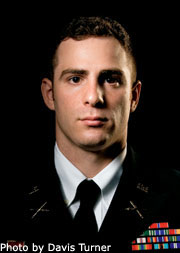Captain Charles Thompson '02
 Homecoming welcomed Thompson with the "startle response," a telltale symptom of combat-related post-traumatic stress disorder (PTSD). "There were little things that bothered me," said the Brooklyn native, "such as car horns and other loud noises. I was easily spooked and more paranoid than the average New Yorker."
Homecoming welcomed Thompson with the "startle response," a telltale symptom of combat-related post-traumatic stress disorder (PTSD). "There were little things that bothered me," said the Brooklyn native, "such as car horns and other loud noises. I was easily spooked and more paranoid than the average New Yorker."
It took about two months for Thompson to wind down from the heightened sensitivity and adrenaline rushes he needed to endure his tour in southern Afghanistan, a Taliban stronghold.
From Kandahar, the country's second largest city, Thompson planned artillery and air strikes in support of ground troops. Occasionally, he'd leave the relative safety of his tactical command center to oversee the execution of his designs from a Black Hawk helicopter.
He survived unscathed nightly mortar and rocket attacks on his airfield base and machine gun fire that tracked his aircraft. "I got lucky," he said. "The cliché about your training kicking in is true. From day one of basic training, we are taught how to deal with violence and death."
The bird's eye perspective from his Black Hawk helped shield Thompson from the carnage below. "I had the luxury of watching all of this from 500 feet," he said, "so I was removed from my handiwork. The smell and sounds of war tend to haunt soldiers more than anything they see."
A political science major, Thompson never considered military service until the domestic terrorist attacks of 9-11. "They were definitely the catalyst for my decision," he said. "All my family worked in Manhattan and every New Yorker knew somebody who was killed or adversely affected."
After a rotation in South Korea, "I was thrilled when I got my orders to go to Afghanistan," he said. "That's why I joined."
He's proud of the enemies he's killed, but knows that collateral damage was an inevitable result of the missions he supported.
Raised a Quaker, Thompson acknowledges that guilt could ambush him years down the road. "I suppose someday I might question what I did over there," he said. "I have a friend with strong misgivings about his actions, who is being counseled for nightmares and substance abuse."
With an eye toward a career in government service, Thompson is earning an online master's degree in diplomacy from Norwich University military college in Northfield, Vermont. His brother Andrew is a 1999 Kenyon alumnus, and another brother Daniel a first-year Kenyon student.
Thompson lives in Fayetteville, North Carolina, where he remains active in the North Carolina National Guard.
"I don't expect any more deployments," he said, "My life has changed dramatically; my wife is expecting our first child. But if it were up to me, I'd go back."